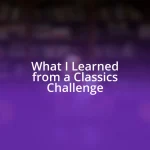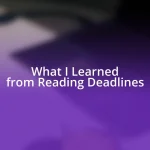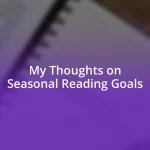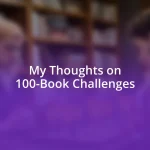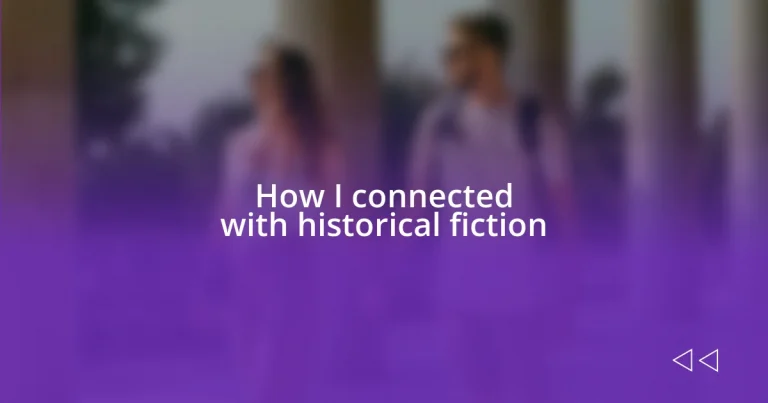Key takeaways:
- Historical fiction evokes emotional connections to the past, allowing readers to empathize with characters’ struggles and inspiring personal exploration of history.
- Engagement with key historical events, such as the Suffragette Movement and the Great Depression, enhances understanding of contemporary societal issues and personal resilience.
- Participating in the historical fiction community fosters camaraderie and enriches the reading experience through shared discussions, diverse interpretations, and author interactions.
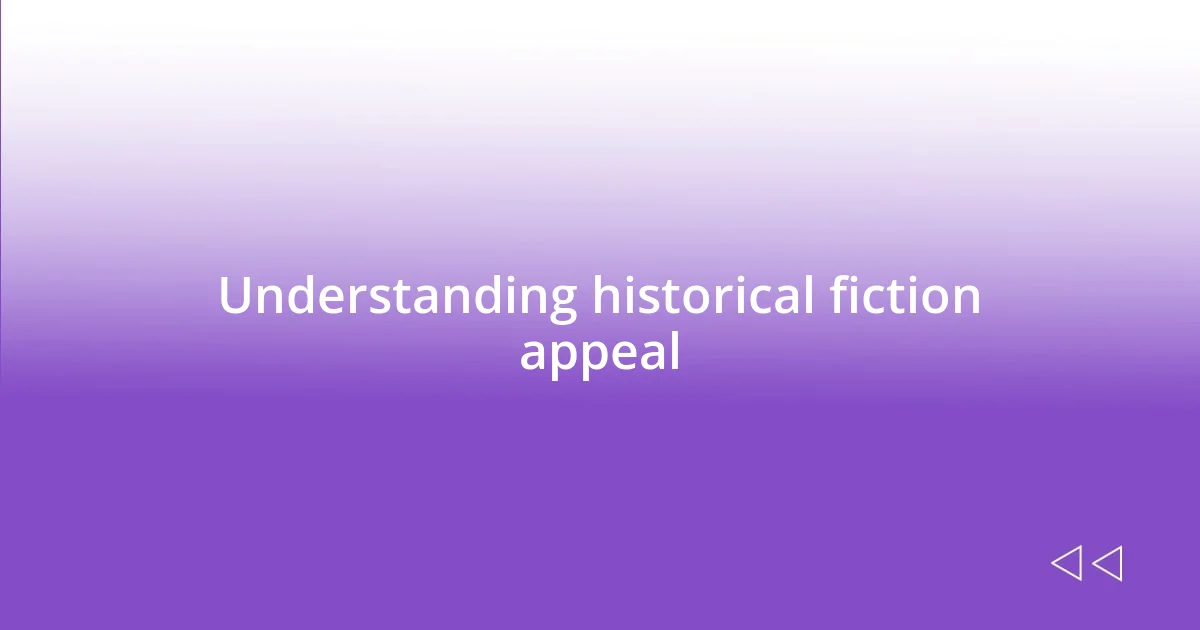
Understanding historical fiction appeal
One of the most captivating aspects of historical fiction is the way it brings the past to life. I remember reading a novel that transported me to the bustling streets of Victorian London, where I could almost smell the coal smoke and hear the clatter of horse-drawn carriages. Isn’t it fascinating how a well-crafted story can allow us to experience the emotions and struggles of people who lived centuries ago?
The emotional depth of historical fiction often resonates with our own lives, creating a powerful connection. For example, while exploring a character’s journey through war, I felt a profound sense of empathy and understanding for their fears and hopes, which mirrored my own challenges. This shared human experience is what pulls us into the narrative and keeps us hooked – don’t you find it incredible how fiction can mirror reality so closely?
Furthermore, the intricate details and rich settings in historical fiction invite readers to step into a different era. I often find myself researching the events tied to a story, which is thrilling. This desire to learn more about historical contexts doesn’t just add layers to my reading; it fosters a deeper appreciation for the real-life events that shaped our world. How about you? Have you ever been inspired to explore history because of a book?
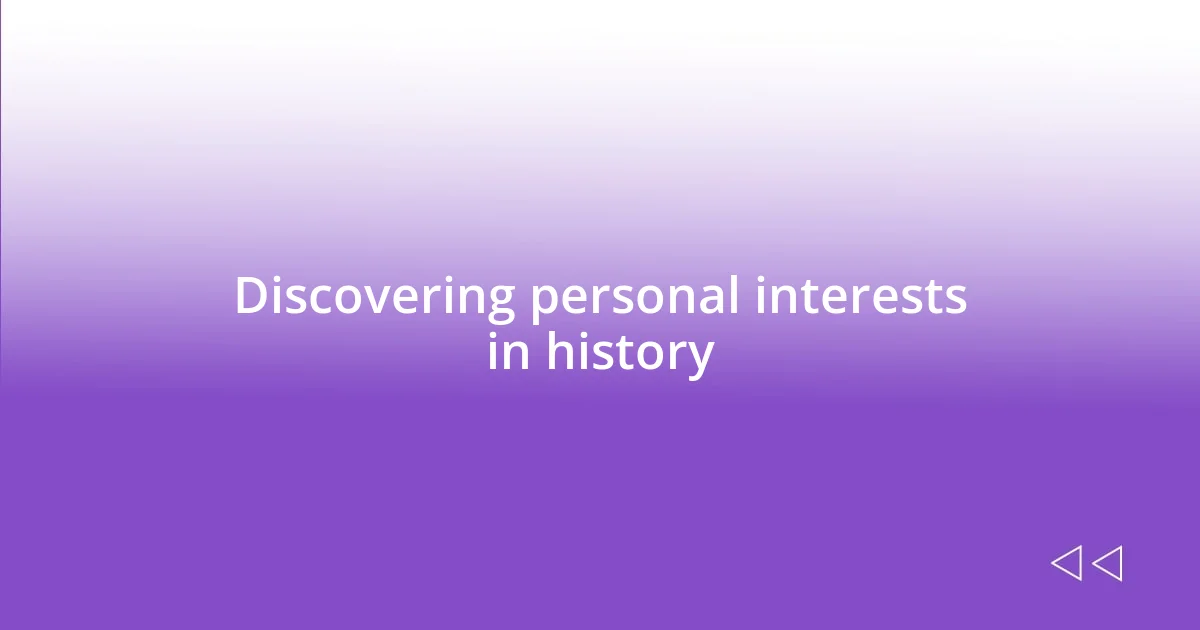
Discovering personal interests in history
Discovering personal interests in history often occurs through the lens of our individual experiences. I recall picking up a historical novel about the American Revolution. With every page, I felt my heart race as I connected to the characters’ struggles for freedom, which resonated with my own love for independence and self-expression. That book not only sparked my interest in that era but also made me realize how deeply history can influence our ideals.
Sometimes, my curiosity nudges me to dive deeper into specific historical figures. For instance, after reading about Marie Curie, I found myself fascinated with her revolutionary contributions to science and the challenges she faced as a woman in a male-dominated field. This personal connection made me explore women’s roles in history, and I was amazed at how many inspiring stories I discovered. It’s empowering to realize that our interests can guide us to uncover untold stories from the past.
Moreover, I’ve noticed that specific events pique my interest based on my background. Growing up near former battlefields, I developed a slight obsession with the Civil War. Visiting those sites ignited vivid images of soldiers and civilians during that tumultuous time. It felt like walking through a living history. How about you? Have your surroundings inspired you to delve into certain periods or events?
| Personal Experience | Historical Interest |
|---|---|
| Victorian London sparked a desire for independence. | American Revolution as a quest for freedom. |
| Marie Curie inspired exploration of women’s roles. | Women in science and history. |
| Civil War battlefields evoked vivid historical images. | Interest in local history. |
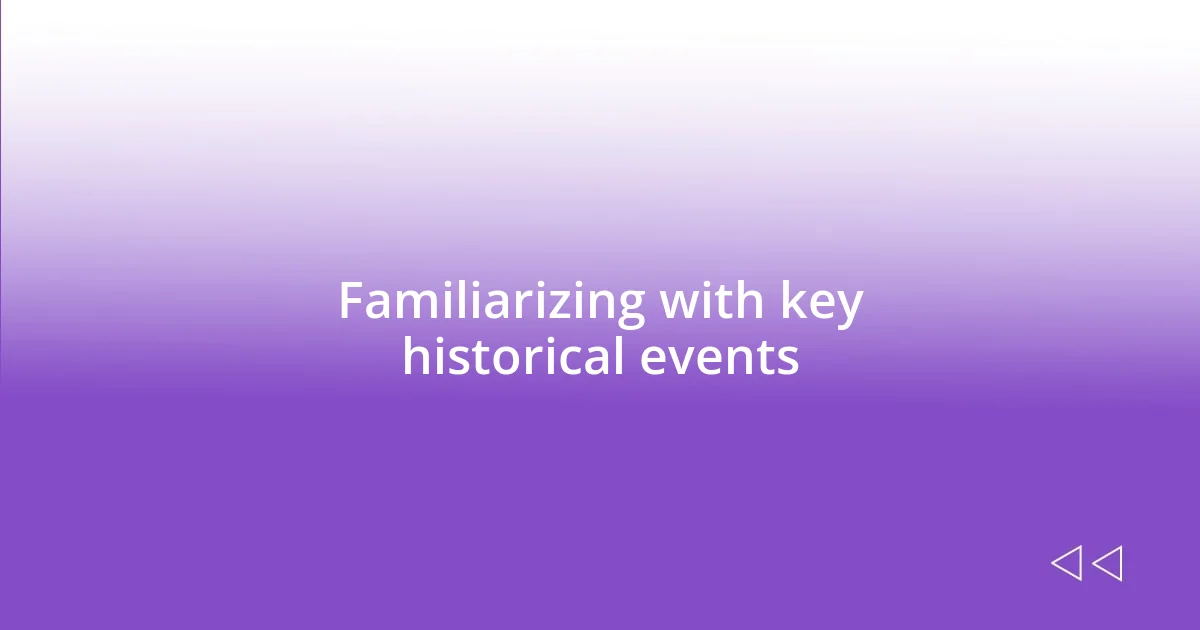
Familiarizing with key historical events
The process of familiarizing myself with key historical events has always felt like embarking on an adventure. I still vividly recall the moment I found a dusty old book about the Renaissance at a quaint little bookstore. As I flipped through its pages, I was awash with excitement over the transformations in art, science, and culture during that time. It’s remarkable how connecting with such pivotal moments in history can ignite curiosity and inspire deeper exploration.
Here are some of the key historical events that have intrigued me:
- The Fall of the Berlin Wall (1989): Witnessing the unification of a divided city opened my eyes to the power of hope and resilience.
- The Suffragette Movement: Learning about the courageous women who fought for their right to vote made me appreciate the ongoing struggle for equality in our society today.
- The Great Depression (1929): Understanding the economic turmoil and the human spirit’s fight for survival during these years deeply resonated with me, particularly during challenging times in my life.
Engaging with these events has not only expanded my historical knowledge but also deepened my understanding of the world we live in today. Each story serves as a reminder of the struggles and triumphs that have shaped humanity.
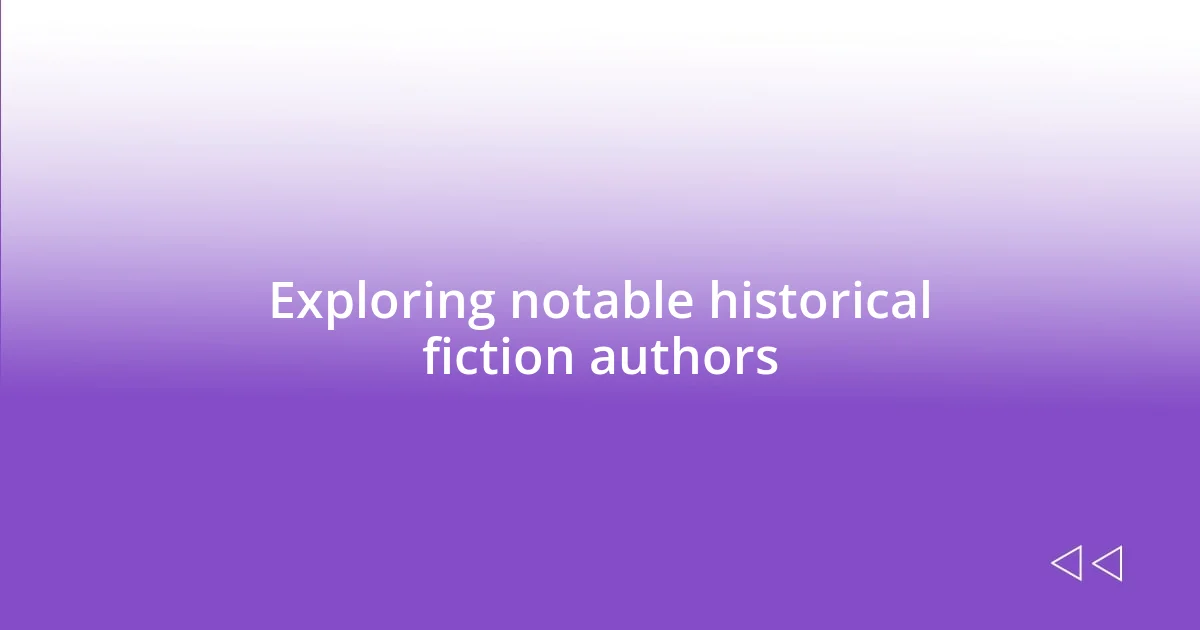
Exploring notable historical fiction authors
One author who truly captured my imagination is Ken Follett. His epic trilogy, “The Century Trilogy,” immerses readers in the tumult of the 20th century through interconnected characters and events. Reading Follett’s work felt like standing on the shoulders of giants, witnessing firsthand the struggles and triumphs that defined an era. I couldn’t help but wonder, how do these fictional narratives breathe life into real historical occurrences?
Then there’s Hilary Mantel, whose “Wolf Hall” swept me away into the court of Henry VIII. I was particularly struck by the way she humanizes Thomas Cromwell, a figure often painted in shadows. As I turned each page, I felt a connection to the complexities of power and ambition, reflecting my own experiences of navigating challenging dynamics in life. I found myself asking, what if history isn’t just about the victors but those whose stories linger in the background?
Finally, I can’t overlook the compelling storytelling of Allison Pataki, particularly in “The Traitor’s Wife.” Her portrayal of the American Revolutionary War through the eyes of Peggy Shippen, a woman often overlooked in history, resonated deeply with me. It reignited my passion for uncovering the narratives of those once silenced by dominant histories. Isn’t it incredible how one author’s perspective can shift our understanding of well-known events, inviting us to discover the untold stories that lie beneath the surface?
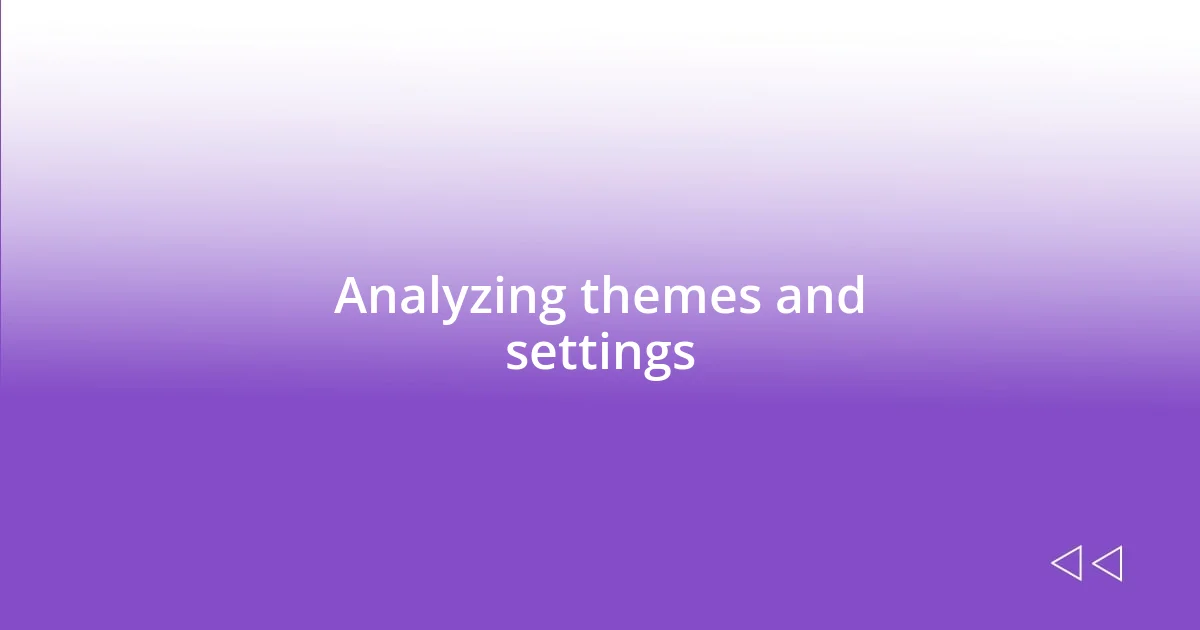
Analyzing themes and settings
As I delve into historical fiction, I’ve noticed how powerful themes—like resilience and the struggle for identity—often emerge from its narratives. For me, reading about characters who face insurmountable odds reminds me of the challenges I’ve encountered in my own life. Have you ever felt that connection to someone else’s struggle? I certainly have, as I found myself cheering for characters who reflect the same tenacity that gets me through my darkest days.
Setting is equally crucial in historical fiction. The vividly described backdrops can transport me through time and space, allowing me to walk the cobblestone streets of a medieval town or feel the tension in a war-era city. I still remember the moment I read about the bustling Parisian cafes during the French Revolution. It felt as if I could smell the brewed coffee and hear the passionate discussions around me. Isn’t it fascinating how a well-crafted setting can make history feel so immediate and alive?
When analyzing these works, I often reflect on the socio-political contexts that shape the narratives. For instance, how does the portrayal of women’s rights during the suffrage movement resonate in today’s ongoing struggles for equality? This kind of thematic reflection allows me to explore not just what happened, but why it matters in our current world. I feel that recognizing these themes adds layers of depth to my understanding of both history and humanity.
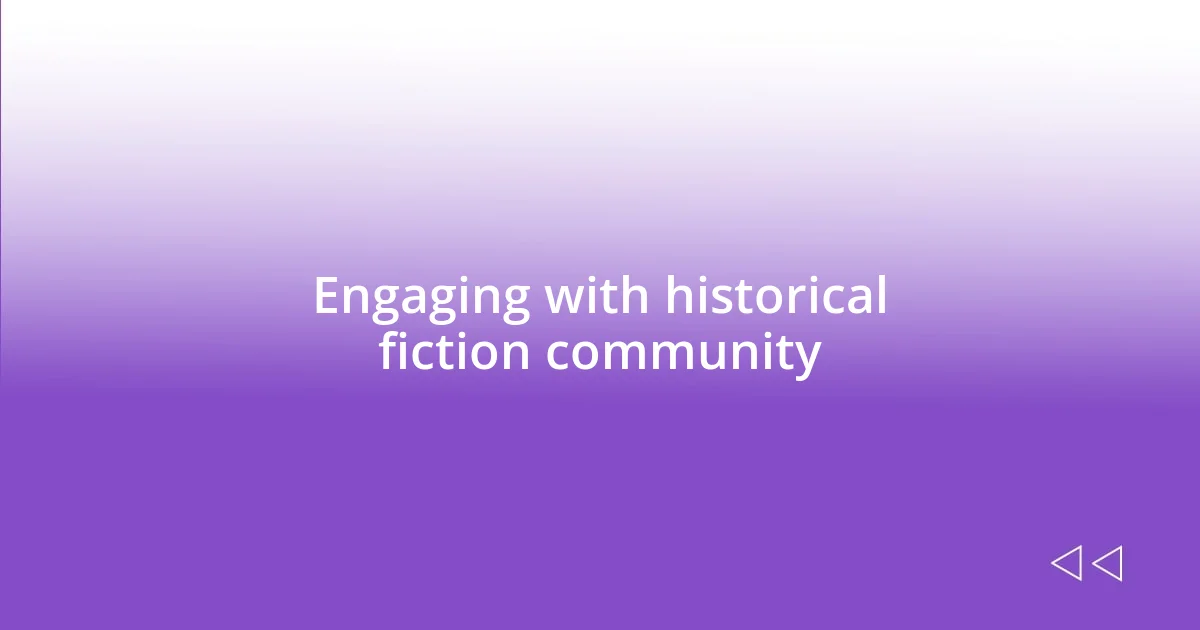
Engaging with historical fiction community
Engaging with the historical fiction community has been an enriching journey for me. I remember the first time I joined an online discussion group dedicated to this genre. The excitement in the air was palpable as we exchanged our favorite reads and debated character motivations. Isn’t it amazing how sharing a book can create a sense of camaraderie among strangers? This connection spurred my curiosity to explore new authors and perspectives, reminding me that literature often serves as a bridge between our unique experiences and collective history.
Participating in book clubs focused on historical fiction has also been a highlight. I recall one memorable meeting where we dissected a novel set during World War II, leading to an impassioned discussion about the moral complexities faced by individuals during wartime. I found it fascinating how everyone brought their own interpretations to the table, enriching my understanding of the narrative. Have you ever noticed how literature can spark such profound conversations that resonate long after the last page is turned? It’s these shared insights that truly bring history to life and deepen our appreciation of the human experience.
Moreover, attending historical fiction author events or festivals has been a delightful experience. I vividly remember listening to an author discuss their creative process behind reconstructing a specific period in their novel. It felt like a privilege to gain insight into their thought process and the research that informed their storytelling. This kind of interaction not only enhances my appreciation for the craft but also inspires me to think critically about the narratives we consume. Engaging with the community has made me realize that historical fiction is not just about the past—it’s a vibrant conversation about who we are as a society today.


